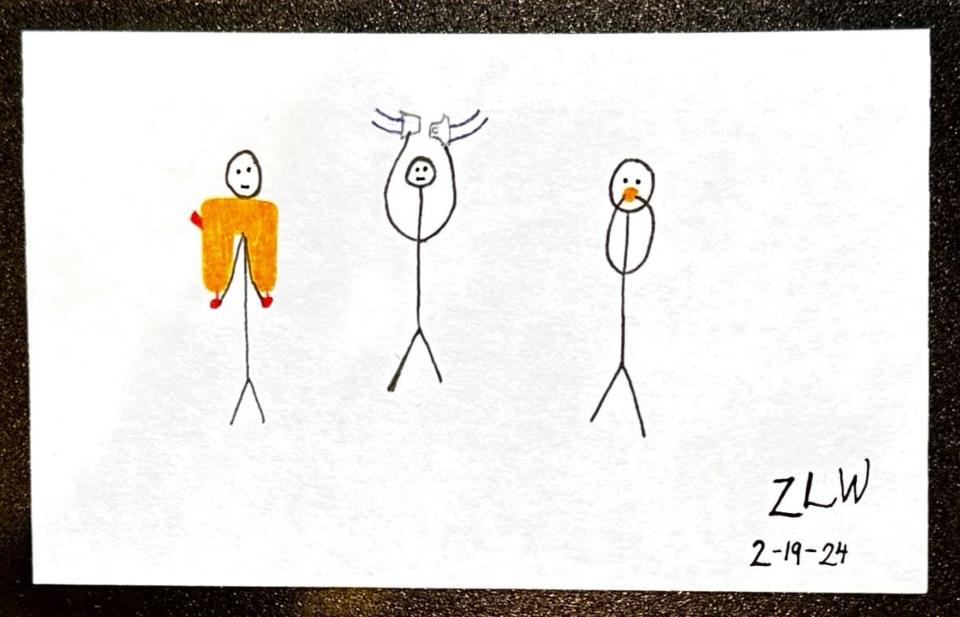Flight attendants aren't there to just pour drinks: What's their job? | Cruising Altitude
There’s a reason pilots can tell flight attendants to halt food and beverage service but can’t order them off the plane. Making you comfortable is a perk, but keeping you safe is why they’re there.
We would all do well to remember that flight attendants are front-line safety professionals. As many airlines undergo contract negotiations, they’re working hard to remind the public why they do what they do.
“People really see us as nagging, and I’m sure it comes off that way a lot of the time,” Rich Henderson, one of the authors of the blog Two Guys on a Plane, told me. “Everything we do is literally to get you out quickly if something happens.”
How are flight attendants trained?
Long before flight attendants step foot on a plane for work, they’re drilled in various safety procedures at their company’s training facilities.
“Customer service was one day of training out of eight weeks,” Henderson said. “We’re fighting fires in training, we’re learning how to do CPR. … We have to know every aircraft type in and out. That could be eight or nine different planes. You’ve got different configurations of each plane where emergency equipment is.”
He emphasized that safety is at the heart of every flight attendant duty, even before they get to the airport.
“We’ve got safety manuals and things, we’ve got electronic devices that have information about safety procedures and emergency procedures,” all of which have to be reviewed before getting on a flight.
Andrew Henderson, Rich’s husband and co-author, said even simple things on the plane have underlying safety purposes.
“The way we position ourselves for boarding and deplaning, the way we move around the cabin during service – everything we do is safety-related,” he said.

How are flight attendants paid?
With flight attendants at many airlines renegotiating their contracts, their compensation is a central debate right now. Alaska Airlines’ flight attendants recently voted to authorize a strike in part because they haven’t been able to come to an agreement with the company’s management about compensation.
The Hendersons said flight attendant pay is complicated no matter the airline.
“I really wish it was simple. Ten years into flying, I still look at my paycheck sometimes and I’m like: ‘What is this number? What are they doing?’ Every airline is different, every contract is different, you’ve got premium pay for certain positions on the aircraft,” Rich said. “There’s just so many different breakdowns.”
One topic central in many negotiations is boarding pay. Flight attendants typically aren’t compensated until the aircraft door is closed. Delta Air Lines is a notable exception for paying its flight attendants for boarding, and flight attendants and their unions at other carriers are pushing for that to become more standard across the industry.
“Boarding pay is such a hot topic right now because that is truly when we are doing the most. So many of our job duties are involved at that time: We’ve got safety-related stuff, we’ve got customer service stuff, we’ve got the pilots to manage, we’ve got gate agents, fellow crew members,” Rich said. “It seems ridiculous that that’s one of the times we’re not paid.”
Flight attendants can spend hours at work but not on the clock for pay. Of course they have to commute to the airport, but they can be there for an hour or more before a flight and potentially for many hours between flights if they’re flying more than one leg in a day. But only the flight hours and minutes on board with the door closed count toward their paycheck.
Whenever I talk to someone who isn’t aware that flight attendants aren’t paid for boarding, they’re usually, and rightfully, shocked. I can’t think of another job where one of the busiest, mandatory parts of your shift goes uncompensated. Imagine how chaotic boarding would be if flight attendants didn’t get on the plane until after we were all already in our seats. They’d probably never make it on the plane, actually, because people would still be fighting over their fractions of the overhead bin space.
Why you should always listen to your flight attendants
There’s a safety reason for pretty much every procedure and announcement on an airplane, and at the end of the day, flight attendants are really there to make sure you don’t get hurt or worse if something goes wrong on your flight.
Listening to their instructions is a legal requirement, but it’s also the best way to ensure you don’t bump your head on the ceiling in turbulence, or get stuck while trying to leave the aircraft if you have to evacuate.
Complying also just makes it easier for flight attendants to keep you safe in general.
“People don’t realize that we are bound by federal aviation regulations, and there are rules and policies from the FAA, from our airlines, that we cannot let slide,” Rich said. “We can get personally fined thousands and thousands of dollars by the FAA if they catch us letting something slide.”
Sara Nelson, president of the Association of Flight Attendants, told me people in her profession are safety professionals first.
“Flight attendants are on there to provide leadership and safety, and ... listening to our instructions throughout the flight is your best chance for having a safe and uneventful flight,” she said.
Flight attendants also have little control – but just as much frustration as passengers – when something goes awry.
“We don’t necessarily have any more information about delays or maintenance issues," Rich said. "We’re going to do everything we can to make people more comfortable. We’re not happy about these delays or maintenance issues or reroutes, either.”
Zach Wichter is a travel reporter based in New York. You can reach him at [email protected]
This article originally appeared on USA TODAY: Safety first: What flight attendants do, don't do | Cruising Altitude
